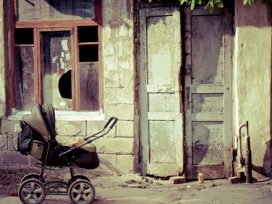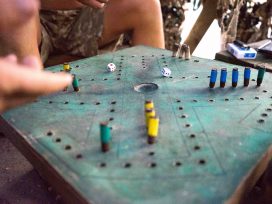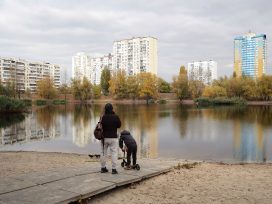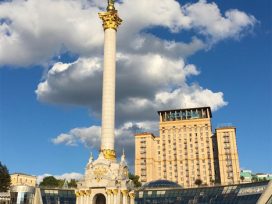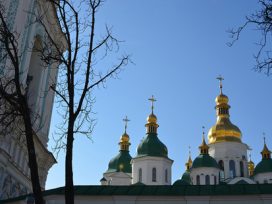The campsite is dismantled within minutes of their eviction. On arrival in Petrosani, Romania, later the same day, a man describes the scene: It was as if we weren’t there, he says. The zeal and indifference of the policemen who cleared the site must have stung. But his words surely also hint at some more elemental trauma. This simultaneous eviction and demolition, in full view of the people it has made homeless, seemed to deny that they were entitled to, or even capable of, any feelings.
Words swarmed forth in response to the recent expulsions of Roma from France, few of them as memorable as that man’s summing-up. Somewhere in Europe, every few years, it becomes expedient that this Question be deemed “un-ignorable”. A dust-cloud of words and statistics arises, after a few months placing a kind of haze over the story, behind which it disappears from view for another year or two.
How to find the words for this that will not merely thicken that dust-cloud?
Where a slip-road meets one of the main highways heading east out of Lille, an empty push-chair is parked up against the crash barrier. A woman stands nearby with the baby on her arm, holding out a paper cup. It’s the onset of the rush-hour and cars must queue before they can merge with the traffic. They have their windows down: it’s late afternoon and hot for September.
Pedestrians were never part of the plan for this landscape. Anyone on foot here quite literally stands out. At each window her murmuring is cut short by the faint shake of a driver’s head. Even from close I can’t tell what language she’s using. Words are as superfluous to her as they are to those she is addressing. This isn’t about words in any language and both parties know it.
But when I ask where she lives she readily points out a nearby wood. The path to it runs through rough grass obliquely down the road embankment. Caravans are crowded under the trees and I’m instantly attracting the curiosity of small children fluent in French. Then come the warier attentions of their parents, less fluent. Finally, remoter still, the greetings of the grandparents, who speak only Romanian. Words are suddenly everything: a young woman takes exception when I cannot understand something she says in French – am I suggesting she never attended school? “Who gave you permission to come in here?” a young man demands, in Romanian. “Where’s your authorisation?” One of the children: “Can you bring me a ball next time you come?” An older woman has heard that the Roma will all have to leave France in two weeks – do I know if it’s that true? “He’s a journalist,” another puts in satirically: “He knows everything.”
It’s the satirist who stays to talk. In answer to my question about what he does he shows me a list of addresses and dates, detailing his rounds. It’s a scrap metal collection scheme run by Lille City Council. He shows me his driving licence, too: it would allow him to work as a lorry-driver anywhere in the EU. I ask why he doesn’t and he grows wide-eyed: “An address like this?” he gestures at the surrounding trees – “Who’s going to hire me and not the other guy?”
On the expulsions he surprises me. “Sarkozy is no fool. It’s true that there are people here who steal. Of course. He’s right. Especially to start with it’s difficult. You’ve got nothing and you can’t do anything without a car. You know how to work – any Romanian can do the work of three Frenchmen – but no one will give you a job. So some people steal. There is work, so they shouldn’t, but…” He shrugs.
“I’ve been here four years. In all that time I’ve spent one night in custody. I picked up some copper pipes which I thought were for collection. The police show up – in the car please, Sir. They were tough. But I explained and they let me go. I’m not asking for special treatment. It’s like this: there is a question of law and there is a question of race. People who have broken the law should go back to Romania. I agree with Sarkozy. But when they clear camps they clear everyone out. I have no police record. I work. And there are plenty like me. If you’ve been here, say, five years, and the police have nothing on you, then you should get a flat. Why not?”
Leaving the wood, I step out into the car park of Lille University’s Institute of Technology. Some of the children follow me a short way, make me promise again to bring them that ball, then turn back. I walk on a few yards and am among students and paved walkways, faculty buildings, lawns. Among people free to imagine their future and work towards it.
Two things I only find out later. First: twelve people, all from that camp, were about to break into the warehouses of a local charity which had on occasion been reluctant to help the Roma. They were all arrested. The man I spoke to was not among them. Second: a four-month-old baby had died on that site a week earlier. Another small child, living with its parents in a tent (it was nearly autumn), had been admitted to hospital with respiratory problems. When the attempted burglary is reported on local TV, neither the death nor the illness nor the charity’s occasional reluctances are mentioned. The only inference to be drawn from the news item is that those Roma are so addicted to stealing they’ll even try to steal what they could have for the asking.
In all of this – from the woman begging at a junction to the news bulletin – where do you place the weight? What really matters in this story?
OK, I was being glib when I talked about the “verbal dust-cloud”. Any words on the subject, my own included, form part of it. If the expulsions were stage-managed, then why not ask, as several writers have, who is directing the show? “Voluntary” expulsions of Roma from France have been occurring at the rate of 8-10,000 per year since 2007, when the Ministry for Immigration, Integration and Cultural Identity was set up. The figures for 2010 are only marginally higher than for the two preceding years. The number of Romanian and Bulgarian Roma in the country has remained constant at around 15,000 throughout. Of those expelled, many go back.
Clearly, then, there was some reason for Sarkozy to foreground this ineffectual policy so abruptly, in July 2010, as the centrepiece of his politique sécuritaire. He argues that the camps are “illegal”. Since 1990 every community in France has been required by (French) law to provide sites for travellers. Between 20 and 40 per cent of communities are in compliance, depending on who you believe. “It’s all very well reminding travellers about the law, but you should be respecting it yourself,” as the politician responsible for the 1990 Act recently put it.
Sarkozy’s order to clear Roma camps was a manoeuvre as uninspired as it was unsurprising from a President beset with financial scandals (note: “financial scandals” West European-style must be clearly distinguished from “corruption”, “delinquency” and “organised crime”, over which eastern Europeans have a monopoly). Sarkozy suffered defeat at local elections in March and his pension reforms were and are proving unpopular on a grand scale.
All this is true. But it is also apparent that state-sponsored mixophobia, as a diversionary tactic, and particularly directed at the Roma, is becoming a regular stand-by for European leaders in their hour of need. Perhaps pushing the Roma around will replace foreign policy adventures as chief buttress of European self-esteem. Moving these people on plays well politically in certain quarters, but “these people” aren’t actually going away and everybody knows it. Romania is not about to overcome its inability to integrate this population, particularly not under current economic conditions. Violent attacks on Roma communities have risen sharply in recent years. The particulars of why Italy last time or France this time matter, but they leave more permanent questions unasked.
Lille’s Museum of Modern Art is re-opening after four years with a new wing dedicated to “Outsider Art”. Stumbling upon the press opening, I claim my badge and enter. The city’s Mayor and the Minister of Culture are expected about midday. The Minister has a Monet exhibition to open in Paris later so he may be a little early, which has set people on edge. Journalists and idle staff await the celebrities. Hassled curators attend to last-minute adjustments. Dark-suited “inconspicuous” types have clearly been assigned to pry into every corner of the place. I have the impression they keep finding me there.
“Outsider Art” is or was produced by people with no formal artistic training – housewives and miners, mental patients and postmen – people who painted or sculpted outside any school or group. I have never heard of it, and am struck by the idea and moved by the work. It is housed here in large, immaculate, air-conditioned spaces of the kind that those who created it, one gathers, rarely enjoyed. Is it churlish of me then, to feel as I do? To compare and contrast this newfound appreciation for Outsider Art with our continuing ambivalence toward outsiders themselves? Why did so many of these gifted people end up in mental wards?
I am leaving just as the ministerial motorcade and Police outriders swerve together into the drop-off area by the main entrance. Into the viewfinders of a dozen or so waiting cameras, from a gleaming fleet of limousines and people-carriers, there emerge: the Insiders.
Lille’s Museum of Modern Art, that wood and the Institute of Technology are all situated on the city’s eastern edge, in the new town of Villeneuve D’Ascq. Three villages were swallowed up at its creation, in 1968. With the textile mills and coal mines of northern France in decline, this massive state-funded project was billed as part of the region’s economic transformation. At its heart there soon stood and still stands the V2 Centre (V for Villeneuve, or “New Town”). At fifty-two thousand square metres, this is one of the biggest shopping malls in France, with airport-size car-parks and restaurants in every imaginable style. It’s like a town centre, except that consumption is the only activity catered for. There is swimmy ambient music as the moving staircases rise and fall. The same five minutes of a documentary about wildlife in the Australian Outback repeat all day on its countless television screens.
If this is the centre, where is the edge? That family with a young child suffering from respiratory problems were given a week in a hotel room after leaving hospital. Ten minutes’ walk from the V2 Centre, there is an area of wasteland where a collective is building them a shelter they can move into once that week is up, close to another, smaller, Roma camp. The panels, roofing and insulation were obtained by a radical priest. Assembling these are students of architecture, philosophy, IT. They are neighbours, teachers, environmental campaigners. They are Catholic believers, readers of Kant, paid-up atheists. Exasperation of all kinds has led to a common determination.
Some Roma advocacy groups argue that such philanthropy only serves to flatter those who dispense it, while perpetuating an image of the Roma as helpless dependents. It plays dumb about the roots of all this: a pervasive and inveterate racism, east and west. I would only add that among the Roma I spoke to nostalgia for Ceausescu was a repeated refrain. They could easily have blamed Romanian racism, but few I talked to did. One old man was typical: he had worked in a clothing factory “until it was sold to God knows who”. I put it to him that 1989 had brought democracy to Romania. “At that time we had no need to wander off outside the country,” he replied bitterly, forgetting perhaps that opportunities for travel were somewhat restricted back then. But he went on: “There was work at home. Then the factories closed and we were hungry: that’s the story.”
If the Roma have found themselves disproportionately affected by “transition”, that may well owe a good deal to racism. But the globalised economy’s short way with places like Romania (and the EU’s promotion of that way) should not be let off so lightly. This is as much about poverty as it is about race and the abattoir of history.
The way we live has as its corollary the removal of such people to the edges of our cities as to the edges of our awareness. There it abandons them, disappears them, sends journalists out to look at them every now and then. And it is nobody’s fault. We “belong” in so far as we possess the means to feel welcome in the V2 Centre. To reflect on what poverty might mean is to reflect on the flimsiness of our own “belonging”. We would, as a rule, rather not. Hence the removal to the periphery of those prompting such reflections. It’s nobody’s fault.
Having admitted what is indeed beyond the reach of philanthropy to alter, let us return briefly to that area of waste ground. It isn’t immediately apparent why it was never built on because the reason is roughly 12 metres beneath your feet. The stone from which old Lille was built, splendid stock exchange and Vauban fortifications included, had not come from far away. The network of galleries still stretches for miles under the countryside around the city and has often served as a wartime shelter or hideout. Thick pillars were left and the limestone was extracted through narrow openings. These were then sealed so that the soil overhead could remain in cultivation. Only as urbanisation took hold here forty years ago did this land, unsafe for building, fall into disuse.
This is relevant because the group building that shelter formed around a core of students well before this “issue” ever arose. They built tree-houses for local children, created footpaths, gardens and picnic areas. They offered guided tours to the natural history of this bit of wilderness and threw neighbourhood parties. They were as dismayed as anyone when the Roma first arrived. For the group’s founder, Yann Lafolie, a student of philosophy and landscape design, the site was not “waste ground” at all. It was, on the contrary, more like a laboratory, a point of encounter between people and nature, ideally suited to the re-working of such dualities.
There was a stand of bee orchids just where the Roma decided to park their caravans. Local interest in the students and their project plummeted. The first group of Roma was expelled but the piles of rubbish were never cleared up. When the next group arrived there was more fly-tipping. Walk any distance into the scrub and there was shit everywhere. Rats shaking the nettles and brambles. Before you get up on that horse too high, ask yourself how you would like that in your local wilderness.
That was the question these students had been set. Yann went and talked to the latest set of new arrivals. They were suspicious at first but he had not until then looked too closely at the conditions these people were living in. Looking now, he realised the group’s old idea would have to be revised. First you had to interrupt this cycle of endless expulsions, each of which only disrupted personal connections and damaged the site further. That meant making the case at city hall level. And sure enough, partly because of pressure groups like this one, Lille has halted all expulsions. Then he needed to know the people who were there now, individually, and “find a way of living together”. That meant making the case with the neighbours. He has never given them money both because he doesn’t have any and because he would tend to agree it only perpetuates dependency. The group threw another party and together with the Roma they helped to clear up the site. He arranged with the city hall for the rubbish to be collected. Further joint neighbourhood-student-Roma parties have been thrown since.
What those who dismiss such efforts themselves miss is the deepening that is possible, whatever your starting-point. I don’t think any of that group “knows” exactly where their project is headed, but what other human answer is there? They are seeking to engage with what is actually the case: EU citizens with nowhere else to go, children with respiratory problems, winter on the way. That will require – already has – the adjustment of old ideas, engagement with the uncomfortable. It’s a risk, but the risk is predicated upon hope.
The alternative?
The alternative is to deny both hope and what is actually the case.
